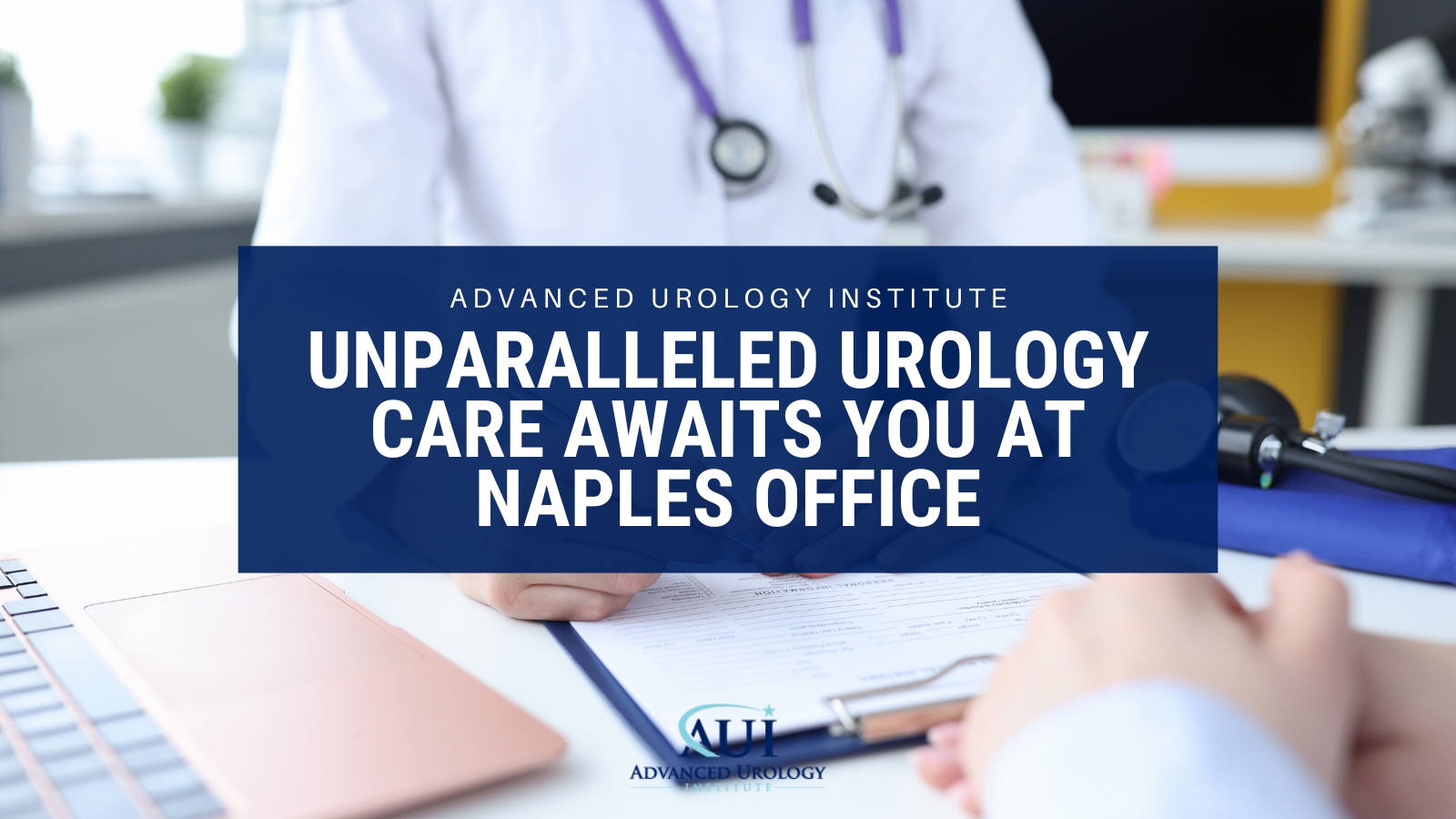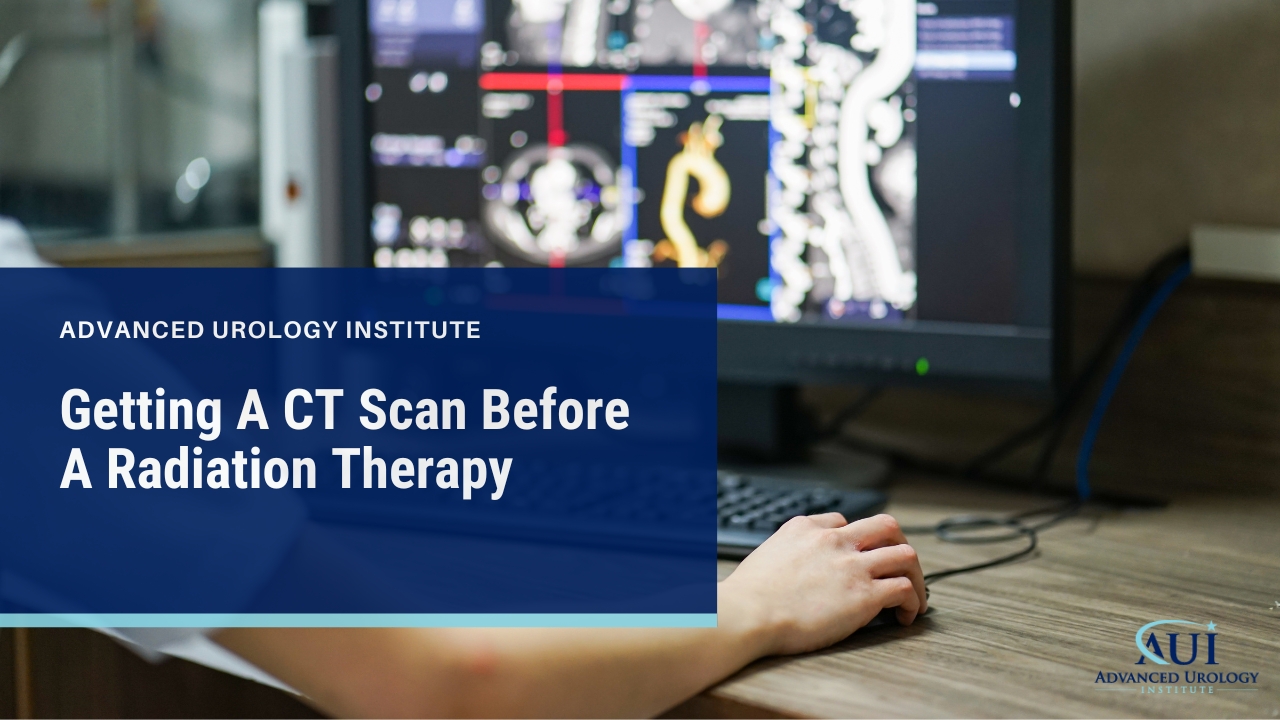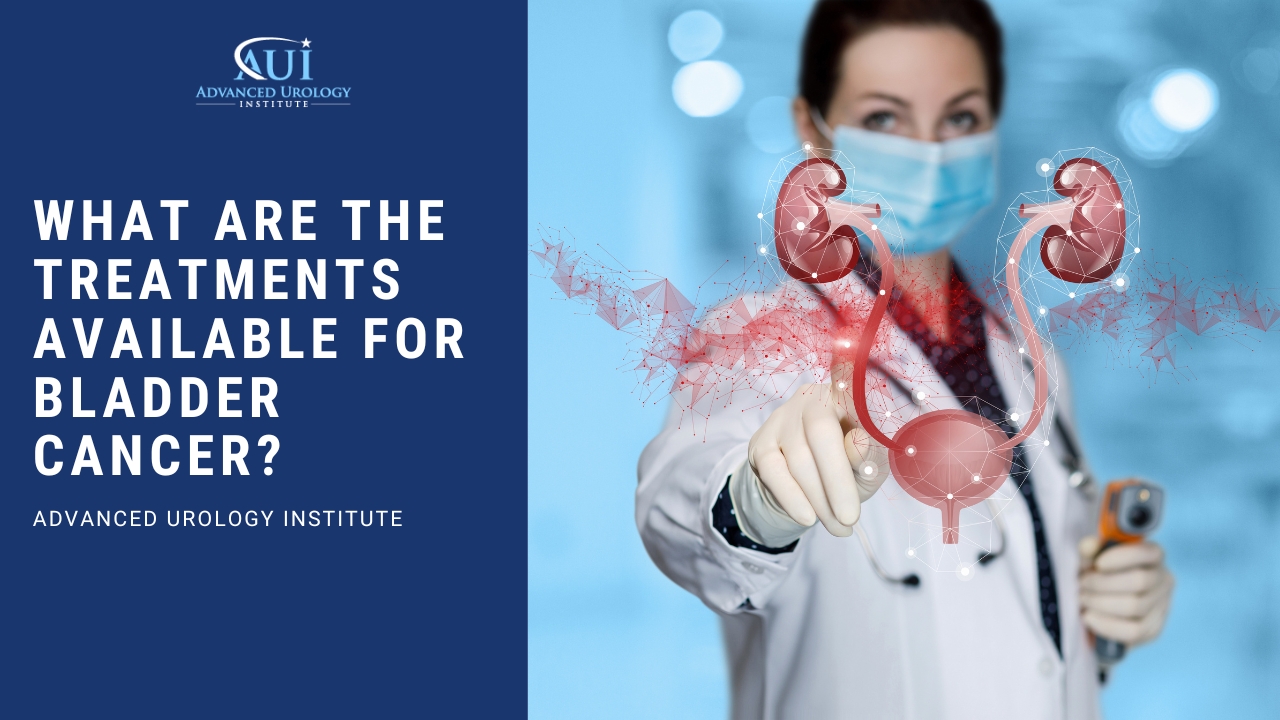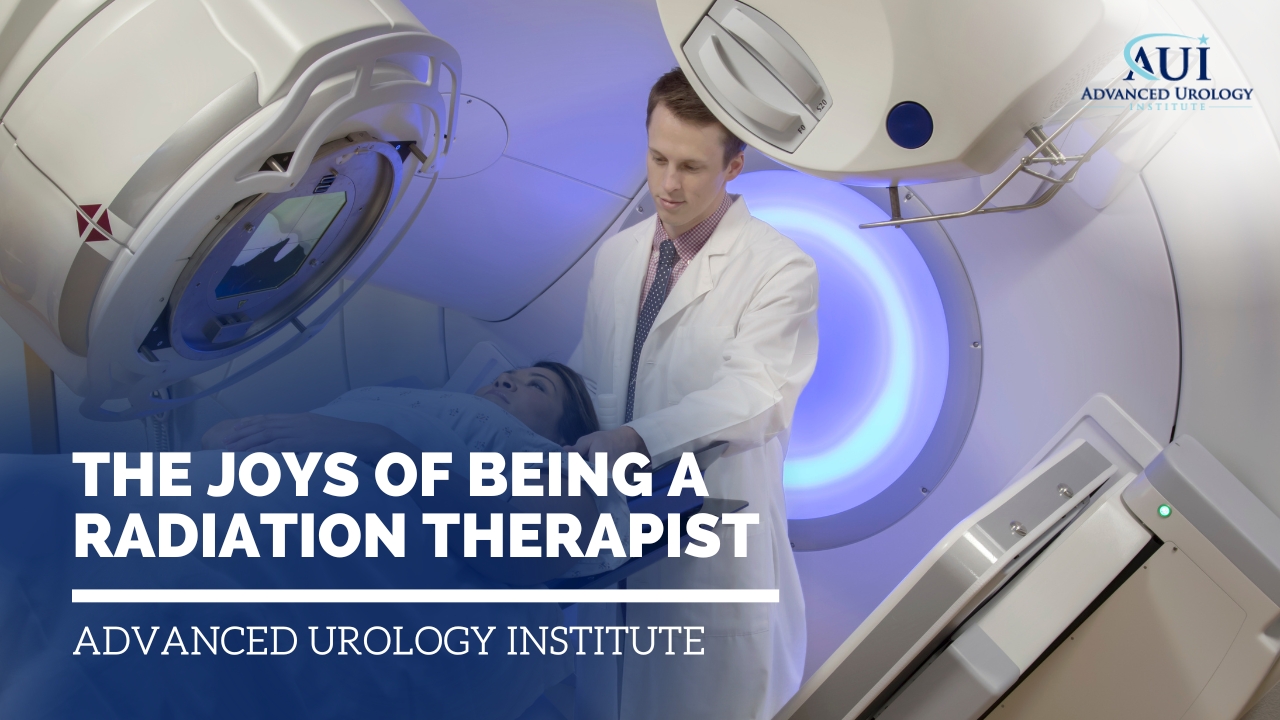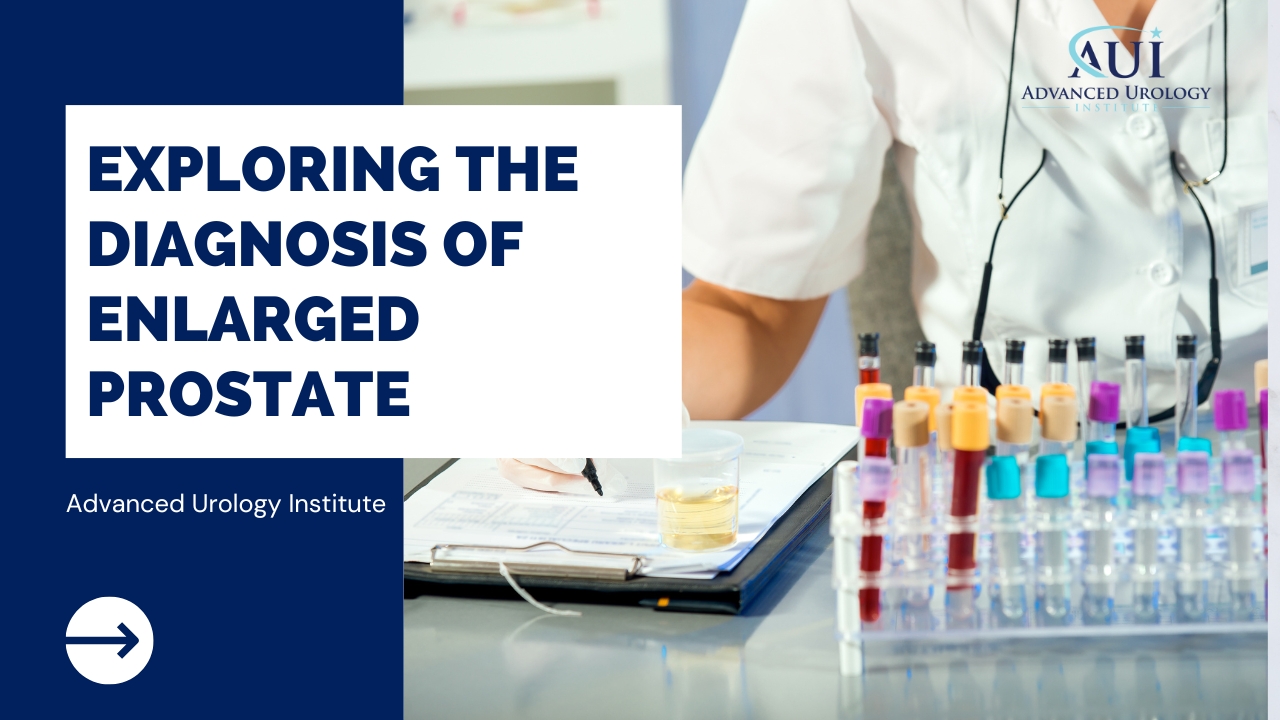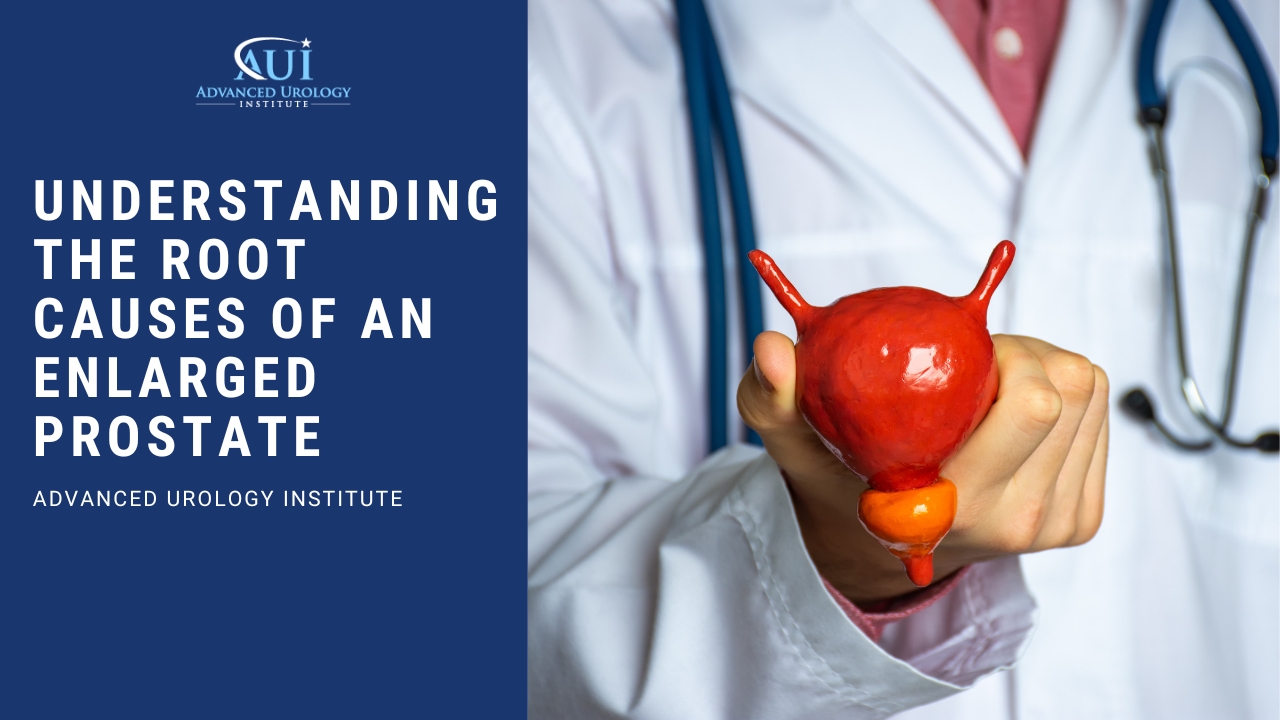National Men’s Health Month (NMHM) is an annual observance in June to bring awareness to the overall health and well-being of men.
Continue readingUnparalleled Urology Care Awaits You at Naples Office
Getting A CT Scan Before A Radiation Therapy
Fred, a radiation therapist at Advanced Prostate Cancer Institute, stresses the importance of a CT scan before radiation therapy.
Continue readingWhat are the treatments available for Bladder Cancer?
The types of treatment available for bladder cancer depend on the stage and type of the condition, as well as the patient’s overall health
Continue readingTrust the Experts at Windsor Oaks Office for Your Urological Needs
AUI’s Windsor Oaks Office is proud to feature a remarkable group of urologists and providers with a passion for patient care.
Continue readingThe Joys of Being a Radiation Therapist
Key Takeaways:
- Radiation therapists have the unique opportunity to develop deep, meaningful connections with the patients they treat.
- Seeing firsthand the positive impact of their work on the lives of the people they treat is a source of great joy and satisfaction.
- As a radiation therapist, you have the chance to grow both personally and professionally as you adapt to the ever-changing field of cancer treatment.
 The Blessing of Impactful Relationships
The Blessing of Impactful Relationships
As a radiation therapist, you have the unique opportunity to develop deep, meaningful connections with the patients you treat. Fred, a radiation therapist at Advanced Urology Institute in Oxford, FL, shares his experience in building these relationships with prostate cancer patients throughout his 20-year career. He says, “It’s not uncommon for me to walk into Walmart on Saturday morning doing our grocery shopping with my wife and somebody will walk up and say, hey Fred, how’s it going?”
As you work closely with patients throughout their treatment, you’ll become an unforgettable figure in their lives, and they’ll undoubtedly become unforgettable to you. While it may be hard to remember everyone’s name, Fred explains that “the face never disappears.” These lasting bonds are a testament to the life-changing work radiation therapists do every day.
The Satisfaction of Seeing Healthy Patients
By being a radiation therapist, you play a crucial role in helping patients recover from life-threatening illnesses. Seeing firsthand the positive impact of your work on the lives of the people you treat is a source of great joy and satisfaction. Patients who show their gratitude for successful treatment and care make the work worth doing. Fred reports that “it’s such a wonderful feeling to see somebody three or four years down the road that walks up, gives you a hug, shakes your hand, and says, thanks, everything is fine.”
The Importance of Continued Growth
Throughout your career as a radiation therapist, you’ll have the opportunity to learn and grow as you treat patients and adapt to the ever-changing field of cancer treatment. This constant evolution ensures that you stay at the top of your game, providing the best care possible for those who rely on you for their health and well-being.
Life at Advanced Urology Institute
As a radiation therapist at Advanced Urology Institute – the largest urology practice in Florida – you’ll have the chance to work alongside other dedicated medical professionals who share your passion for helping patients. The supportive, collaborative environment at the practice ensures that all members of the team work together to provide the highest level of care for those undergoing prostate cancer treatment.
Join the Team and Experience the Joys for Yourself
If you’re intrigued by the idea of being a radiation therapist and have a passion for helping others, consider joining the team at Advanced Urology Institute in Oxford, FL. You’ll have the opportunity to develop lasting relationships, experience the satisfaction of seeing healthy patients, and grow both personally and professionally. In the end, you’ll understand precisely what makes this work so rewarding and fulfilling.
References:
- “Radiation Therapist Career.” https://www.cambridgehealth.edu/radiation-therapist/radiation-therapist-career/.
- “5 Reasons to Become a Radiation Therapist.” https://www.cambridgehealth.edu/radiation-therapist/become-a-radiation-therapist/5-reasons-to-become-a-radiation-therapist/.
- “14 Pros and Cons of Being a Radiation Therapist.” https://www.exploremedicalcareers.com/radiation-therapist/pros-and-cons/.
Transcription:
My name is Fred. I’m a radiation therapist here at Advanced Prostate Cancer Institute. I’ve been doing this for about 20 years and it’s all been in this local area. It’s not uncommon for me to walk into Walmart on Saturday morning doing our grocery shopping with my wife and somebody will walk up and say, hey Fred, how’s it going? You turn around and you look and it’s somebody that you treated a year, two, three, four years ago, five years ago. It’s to the point now that I’ve been here long enough to where I can’t remember everyone’s name. There’s literally been thousands of people that have come across these tables that I’ve been using to treat patients with, but the face never disappears. And it’s such a wonderful feeling to see somebody three or four years down the road that walks up, gives you a hug, shakes your hand and says, thanks, everything is fine. That’s what makes this job worth doing.
What are the early warning signs of Bladder Cancer that we should be aware of?
Key Takeaways:
- Bladder cancer is a common form of cancer in the US and it’s important to be aware of the warning signs including blood in urine, painful urination, urgency and frequent need to urinate.
- If any of these symptoms are present it’s important to seek medical attention and get a diagnostic evaluation to confirm the diagnosis.
- There are several measures for prevention and reducing the risk of bladder cancer, such as quitting smoking, limiting exposure to toxins and drinking lots of fluids. Advanced Urology Institute is the largest urology practice in Florida and provides personalized and advanced care.
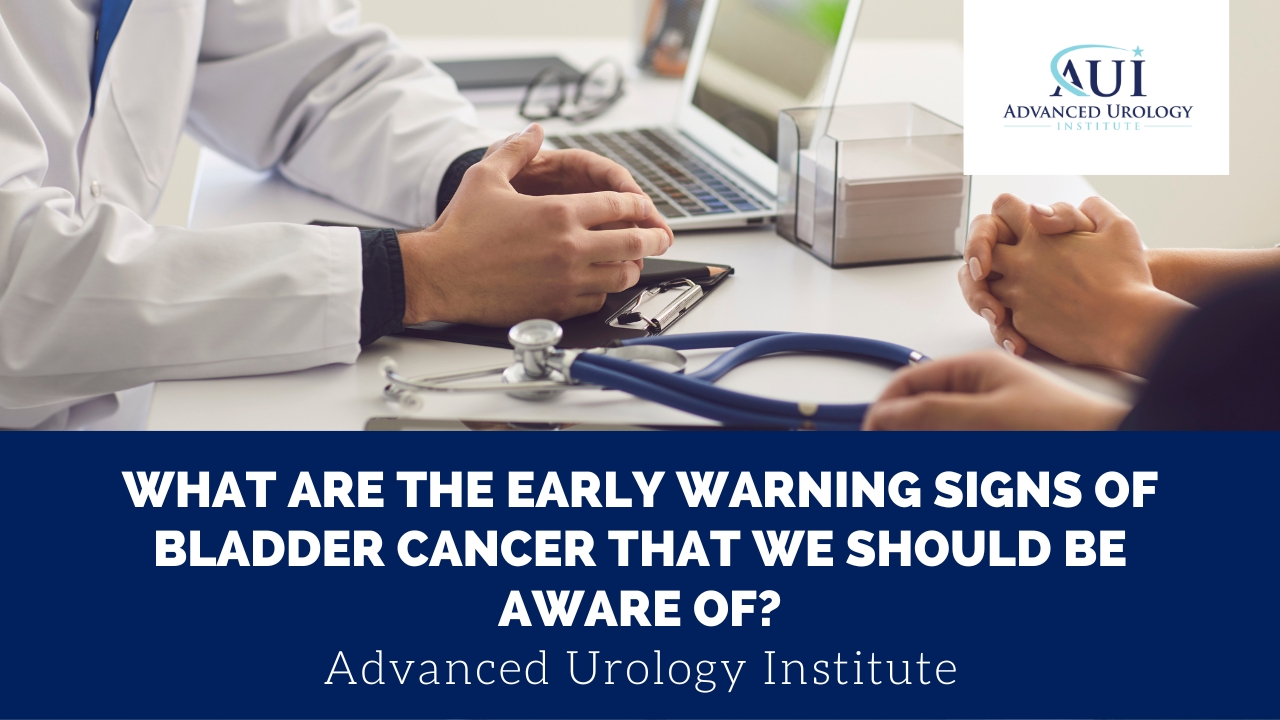 Bladder cancer is a form of cancer that starts in the bladder, which is an organ responsible for storing urine in the body. According to the National Cancer Institute, bladder cancer is the sixth most common form of cancer in the United States, with an estimated 79,030 new cases this year.
Bladder cancer is a form of cancer that starts in the bladder, which is an organ responsible for storing urine in the body. According to the National Cancer Institute, bladder cancer is the sixth most common form of cancer in the United States, with an estimated 79,030 new cases this year.
There are a variety of risk factors associated with bladder cancer, including a family history of bladder cancer, gender, age, and certain habits such as smoking. Men are more likely than women to develop bladder cancer, and are especially at a higher risk if they are over the age of 40.
Early detection of bladder cancer is key for successful treatment, but it’s important to first be aware of the warning signs. The most common symptom of bladder cancer is hematuria, or blood in the urine, but there are several other warning signs to look out for including painful urination, urinary urgency, and a frequent need to urinate.
If any of the aforementioned symptoms are present, it’s important to get a diagnostic evaluation from a doctor. The doctor may conduct a physical exam and evaluate the patient’s medical history. Imaging tests such as a CT or MRI scan may also be performed. If cancer is suspected, a tissue sample or biopsy may be collected to confirm the diagnosis.
If bladder cancer is confirmed, treatment may consist of surgery, chemotherapy, or radiation therapy. Surgery is often recommended to remove any cancerous tumors in the bladder, and chemotherapy or radiation therapy may be used in addition to the surgery if necessary.
Although there is no way to guarantee prevention of bladder cancer, there are steps people can take to reduce their risk. Quitting smoking is highly recommended, as is limiting exposure to toxins, and drinking plenty of fluids.
In summary, bladder cancer is a serious health condition that can be successfully treated if detected early. Early-warning signs of bladder cancer include blood in the urine, pain during urination, urinary urgency, and frequent need to urinate. If any of these symptoms are present, a doctor should be contacted for an evaluation. Treatment options may include surgery, chemotherapy, and radiation therapy after an official diagnosis is made. There are several measures people can take to reduce their risk of bladder cancer, including quitting smoking, limiting exposure to toxins, and drinking plenty of fluids.
If you ever experience any of the symptoms listed and suspect that you may have bladder cancer, it’s important to seek help from a medical professional. Advanced Urology Institute is the largest urology practice in Florida, providing advanced and personalized care to help people lead healthier lives.
REFERENCES:
- “Bladder cancer – Symptoms and causes – Mayo Clinic.” 19 Apr. 2022, https://www.mayoclinic.org/diseases-conditions/bladder-cancer/symptoms-causes/syc-20356104.
- “Can Bladder Cancer Be Found Early?.” 30 Jan. 2019, https://www.cancer.org/cancer/bladder-cancer/detection-diagnosis-staging/detection.html.
- “Bladder Cancer: Diagnosis – Cancer.Net.” https://www.cancer.net/cancer-types/bladder-cancer/diagnosis.
Experience Premier Urology Care at Timber Ridge Office
Key Takeaways:
- Advanced Urology Institute’s Timber Ridge Office offers world-class urological care in Ocala, Florida.
- The office boasts a team of highly skilled and experienced urologists, providing comprehensive urology services.
- Timber Ridge Office is committed to delivering exceptional patient experiences in a professional, friendly environment.
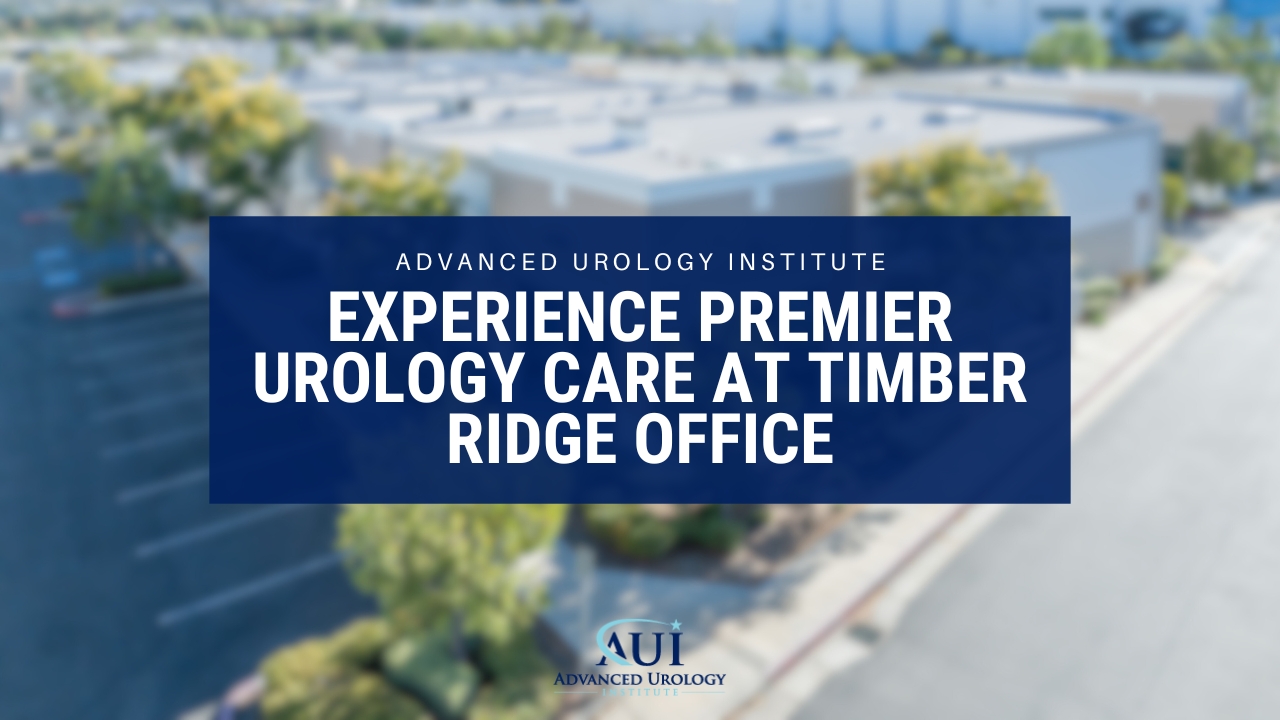 Your health is of paramount importance, and when it comes to urological care, you should expect nothing less than the best. Advanced Urology Institute’s Timber Ridge Office in Ocala, Florida, is dedicated to providing top-tier urology services to help you maintain optimal health. Located at 9401 SW State Road 200, Suite 3001, Ocala, FL 34481, the Timber Ridge Office is home to a team of distinguished medical professionals who are passionate about your well-being.
Your health is of paramount importance, and when it comes to urological care, you should expect nothing less than the best. Advanced Urology Institute’s Timber Ridge Office in Ocala, Florida, is dedicated to providing top-tier urology services to help you maintain optimal health. Located at 9401 SW State Road 200, Suite 3001, Ocala, FL 34481, the Timber Ridge Office is home to a team of distinguished medical professionals who are passionate about your well-being.
At the Timber Ridge Office, you’ll find an impressive lineup of accomplished urologists, including Dr. David Cunningham, Dr. Mark W. Dersch, Dr. Saumil Karavadia, Dr. Edward D. King, Dr. Dinesh S. Rao, and Dr. Harvey C. Taub. Each of these providers brings their unique expertise and dedication to patient care, ensuring that you receive the highest quality urological services in a comfortable and welcoming setting.
Dr. David Cunningham, MD, is a skilled urologist with a focus on minimally invasive surgical techniques, offering innovative treatment options for a variety of urological conditions. Dr. Mark W. Dersch, MD, specializes in general urology, providing comprehensive care for patients with a wide range of urological concerns. Dr. Saumil Karavadia, MD, is an experienced urologist, offering expertise in kidney stones, prostate health, and urologic oncology.
Dr. Edward D. King, MD, FACS, is a board-certified urologist and Fellow of the American College of Surgeons, providing advanced surgical care to his patients. Dr. Dinesh S. Rao, MD, is a dedicated urologist, offering expertise in robotic-assisted surgery for various urological conditions. Dr. Harvey C. Taub, MD, is an accomplished urologist, providing comprehensive care for patients with a wide range of urological issues.
At the Timber Ridge Office, you can expect a complete spectrum of urological services, including diagnostic testing, surgical procedures, and medical management for conditions such as kidney stones, urinary incontinence, prostate health, and urologic cancers. The team is committed to offering you the latest treatment options, utilizing state-of-the-art equipment and techniques.
As a patient at the Timber Ridge Office, you’ll experience a professional, yet friendly atmosphere where your needs are prioritized, and your questions are answered. The staff is dedicated to providing you with exceptional care, ensuring that you feel comfortable and informed throughout your treatment journey.
To take the first step toward better urological health, contact the Advanced Urology Institute’s Timber Ridge Office today by calling (352) 351-2801 to schedule an appointment or to speak with a member of their knowledgeable staff. Discover the difference that premier urology care can make in your life.
Discover Exceptional Urological Care at Port Orange Office
Key Takeaways:
- Advanced Urology Institute’s Port Orange Office provides top-notch urological care in Florida.
- The office is staffed by skilled and experienced urologists, Dr. Evan Fynes and Dr. Samuel Lawindy.
- The Port Orange Office offers a range of urological services in a professional, friendly, and patient-focused environment.
 When it comes to your health, especially in the area of urology, you deserve the best care possible. That’s where Advanced Urology Institute’s Port Orange Office comes in. As part of the largest urology practice in Florida, this office is committed to providing you with the highest quality urological care. Located at 900 N. Swallow Tail Dr., Suite 106, Port Orange, FL 32129, the Port Orange Office is staffed by an exceptional team of medical professionals, ready to address your unique needs.
When it comes to your health, especially in the area of urology, you deserve the best care possible. That’s where Advanced Urology Institute’s Port Orange Office comes in. As part of the largest urology practice in Florida, this office is committed to providing you with the highest quality urological care. Located at 900 N. Swallow Tail Dr., Suite 106, Port Orange, FL 32129, the Port Orange Office is staffed by an exceptional team of medical professionals, ready to address your unique needs.
At the helm of the Port Orange Office are two accomplished urologists, Dr. Evan Fynes and Dr. Samuel Lawindy. These providers bring their extensive experience and expertise to the practice, ensuring that you receive the best urological care in a comfortable and friendly environment.
Dr. Evan Fynes, MD, is a skilled urologist with a focus on minimally invasive surgical techniques. This approach allows him to provide treatment options with less pain, shorter recovery times, and fewer complications. Dr. Fynes is dedicated to helping you achieve optimal health and wellbeing, using the latest advancements in urological care.
Dr. Samuel Lawindy, MD, is another highly regarded urologist at the Port Orange Office. He specializes in general urology, as well as urologic oncology, offering comprehensive care for patients with urological cancers. Dr. Lawindy’s patient-focused approach ensures that you are always at the center of your treatment plan, allowing for personalized care tailored to your individual needs.
At the Port Orange Office, you can expect a wide range of urological services, including diagnostic testing, surgical procedures, and medical management for conditions such as kidney stones, urinary incontinence, prostate health, and urologic cancers. The team is committed to providing you with the most advanced treatment options, using state-of-the-art equipment and techniques.
As a patient at the Port Orange Office, you’ll experience a professional yet friendly atmosphere where your concerns are heard, and your questions are answered. The staff is dedicated to providing you with the best possible care, ensuring that you feel comfortable and informed throughout your treatment journey.
To take the first step toward better urological health, contact the Advanced Urology Institute’s Port Orange Office today. You can reach them by calling (386) 239-8500 to schedule an appointment or to speak with a member of their knowledgeable staff. Experience the difference that exceptional urological care can make in your life.
What are the latest innovative treatments for Testicular Cancer that can help you beat the disease?
Key Takeaways:
- Testicular cancer is the most common cancer in men between 15 – 35 and treatments include surgery, chemotherapy, radiation therapy, dietary and lifestyle changes, herbal supplements and acupuncture.
- Each treatment carries benefits and risks which require investigation and consultation with a medical professional before making a decision.
- Advanced Urology Institute provides comprehensive urological services for residents of Broward, Miami-Dade and Palm Beach Counties.
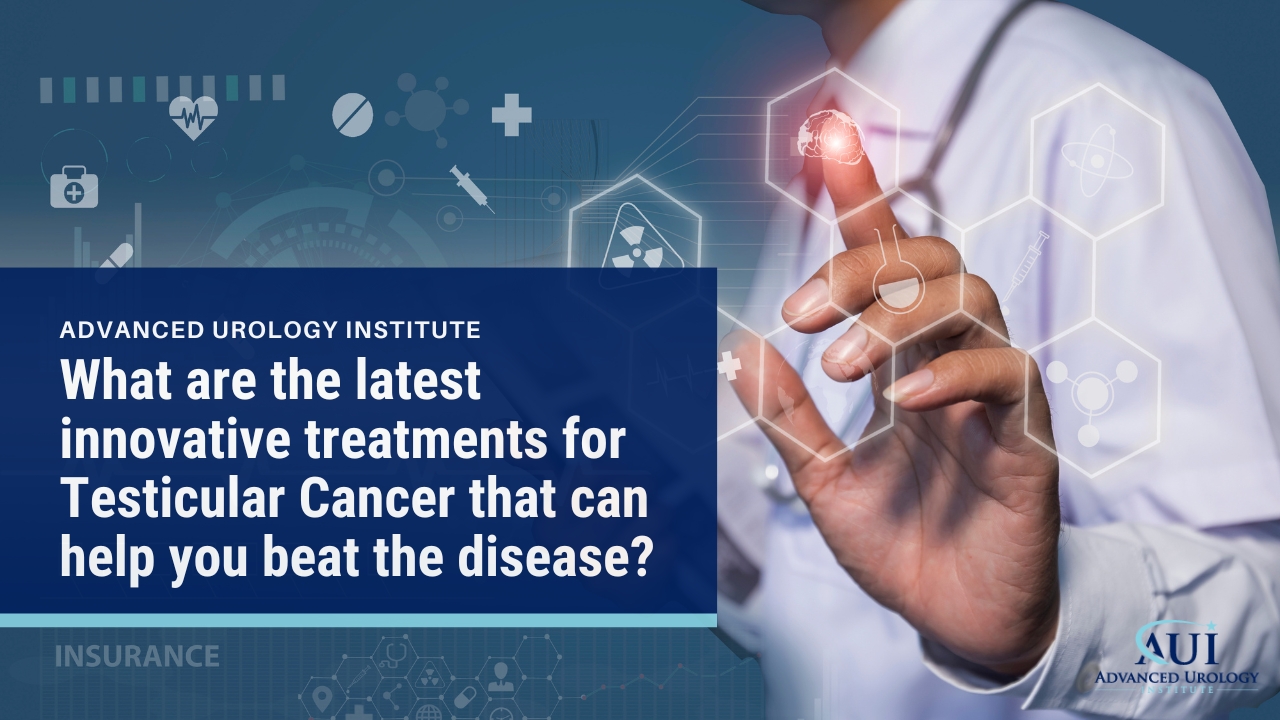 Testicular cancer is a disease caused by the rapid and abnormal growth of cells in the testicles, and it is the most common cancer in males between the ages of 15 and 35. While there is no clear reason why this type of cancer occurs, it is important to be aware of the available treatment options in order to properly address the issue. There are a variety of innovative treatments that can help individuals beat testicular cancer and achieve long-lasting health outcomes.
Testicular cancer is a disease caused by the rapid and abnormal growth of cells in the testicles, and it is the most common cancer in males between the ages of 15 and 35. While there is no clear reason why this type of cancer occurs, it is important to be aware of the available treatment options in order to properly address the issue. There are a variety of innovative treatments that can help individuals beat testicular cancer and achieve long-lasting health outcomes.
Traditional treatments for testicular cancer include surgery, chemotherapy, and radiation therapy. Surgery involves the removal of the affected testicle or testicles through orchiectomy. This is a minimally invasive procedure that can be done on an outpatient basis, with most individuals able to resume regular activity within a few days. Chemotherapy uses special drugs to kill cancer cells and can be used before or after surgery. Radiation therapy uses targeted radiation beams to kill cancer cells and is typically only used for advanced cases, in cases where the cancer is at a high risk of coming back, or when other treatments have not been successful.
Alternative treatments are also available for those looking to treat testicular cancer without traditional methods. Dietary and lifestyle changes can be beneficial for some cases and may include eliminating or reducing caffeine and alcohol consumption, eating a well-balanced diet, exercising regularly, and reducing stress. Herbal supplements have also been used to treat the disease, although there is limited evidence to support their effectiveness. Acupuncture has been suggested as a treatment for some, however it is important to remember that there is no certainty of its effectiveness in treating cancer.
Benefits and risks must be considered when it comes to any type of treatment for testicular cancer. The potential benefits of traditional treatments include the possibility of a complete cure or long-term remission, while the potential risks or side effects can vary greatly depending on the individual and the treatment being used. When considering alternative treatments, it is best to consult a medical professional before making a decision to ensure safety and efficiency.
In conclusion, there are a variety of treatments available for testicular cancer, ranging from traditional treatments such as surgery and chemotherapy, to alternative treatments such as dietary and lifestyle changes, herbal supplements, and acupuncture. Each treatment carries its own set of benefits and risks, and it is important for individuals to discuss them with their doctor in order to make the most informed decision. With the right treatment plan, testicular cancer can be successfully beaten.
It is important to research each treatment option and discuss them with a qualified urologist to ensure that the proper treatment plan is being tailored to meet the individual’s needs. At Advanced Urology Institute, we offer comprehensive urological services and an experienced team of board-certified urologists. We are the largest urology practice in Florida, providing services to residents of Broward, Miami-Dade, and Palm Beach counties. Contact us today to learn more.
REFERENCES:
- “Testicular Cancer: Symptoms, Diagnosis & Treatment.” https://www.urologyhealth.org/urology-a-z/t/testicular-cancer.
- “Testicular Cancer: Types of Treatment.” https://www.cancer.net/cancer-types/testicular-cancer/types-treatment.
- “Surgery for Testicular Cancer | Orchiectomy | Testicle Removal.” https://www.cancer.org/cancer/testicular-cancer/treating/surgery.html.
What are the key warning signs of Testicular Cancer that you should not ignore?
Key Takeaways:
- Testicular cancer is the most common type of cancer in men aged 15-35 with the main symptom being a lump or swelling of the testicle.
- Risk factors of testicular cancer include family history, undescended testicular, and testicular trauma.
- Early diagnosis and treatment options such as chemotherapy, radiation therapy, and surgery make testicular cancer very treatable.
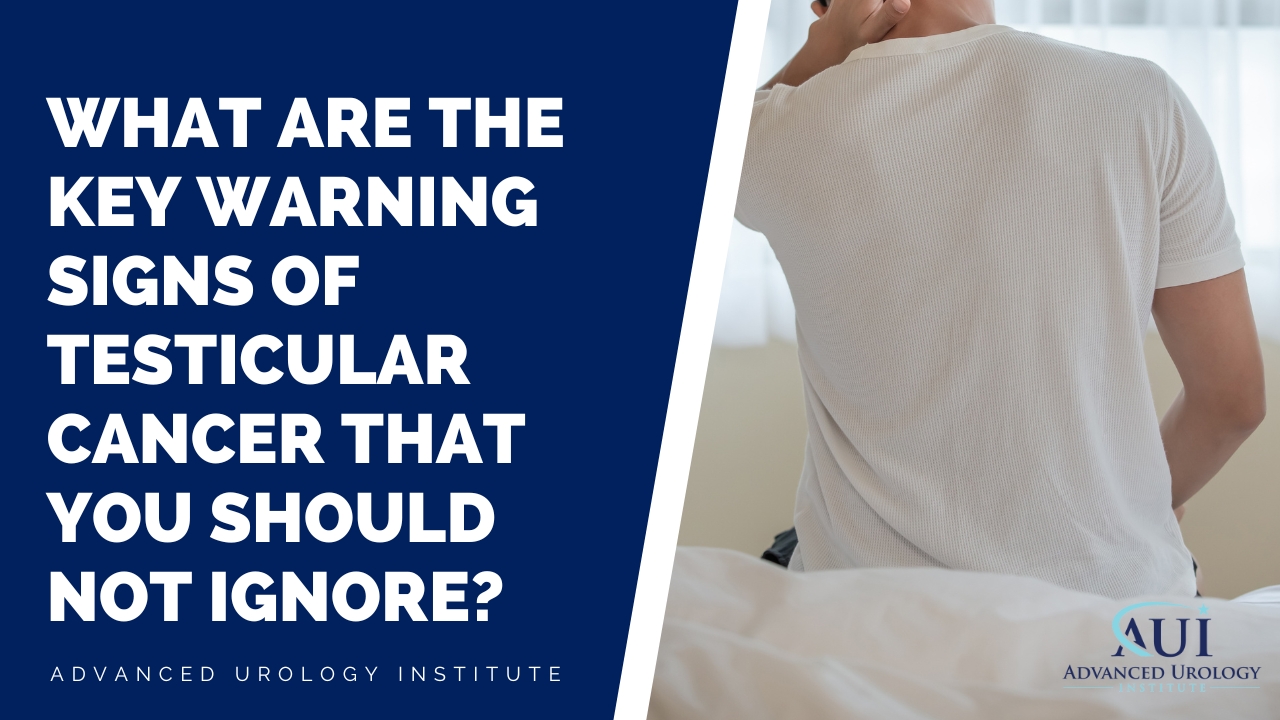 Testicular cancer is a type of cancer that affects the testicles in men. The testicles are the part of the male anatomy responsible for producing sperm and male hormones. Testicular cancer is the most common type of cancer in men age 15-35, but it can occur at any age. It is usually very treatable when caught in its early stages. However, if left untreated, it can spread to other parts of the body, making it much more difficult to treat. That is why it is so important to know the warning signs of testicular cancer, so you can take action as soon as possible if you see any signs or symptoms.
Testicular cancer is a type of cancer that affects the testicles in men. The testicles are the part of the male anatomy responsible for producing sperm and male hormones. Testicular cancer is the most common type of cancer in men age 15-35, but it can occur at any age. It is usually very treatable when caught in its early stages. However, if left untreated, it can spread to other parts of the body, making it much more difficult to treat. That is why it is so important to know the warning signs of testicular cancer, so you can take action as soon as possible if you see any signs or symptoms.
Purpose of the Article
The purpose of this article is to provide an overview of the warning signs of testicular cancer so that you can take action if you notice any of the symptoms. We will look at the signs and symptoms, risk factors, diagnosis and treatment options for testicular cancer.
Signs and Symptoms of Testicular Cancer
The most common symptom of testicular cancer is a swelling or lump on the testicle. This lump may be firm or hard and can range in size from a pea to a golf ball. It may be painless or tender to the touch. If you notice a lump, it is important to make an appointment with a doctor right away.
Other symptoms of testicular cancer include pain or discomfort in the groin area, a heavy or dragging feeling in the lower abdomen, lower back pain, an accumulation of fluid in the scrotum, and breast growth or tenderness. These symptoms can vary from person to person, so if you notice any changes, it is important to be checked out by a doctor.
Risk Factors and Prevention
There are certain factors that can increase the risk of testicular cancer. These include having a family history of testicular cancer, having an undescended testicle, or a history of testicular trauma. It is important to know the risk factors and take steps to reduce your risk. Some prevention tips include regular self-exams of the testicles, avoiding cigarette smoking, and maintaining a healthy weight.
Diagnosis and Treatment
If you experience any of the symptoms of testicular cancer, it is important to be diagnosed and treated as soon as possible. Your doctor will likely perform an ultrasound of the testicle and a biopsy to determine if cancer is present. If the test results come back positive, your doctor will likely recommend treatment with chemotherapy, radiation therapy, or surgery.
Conclusion: Summary of Testicular Cancer
Testicular cancer is a serious health issue for men of all ages. It is important to be aware of the warning signs of testicular cancer, so you can take action as soon as possible if any symptoms arise. The most common symptom of testicular cancer is a lump or swelling on the testicle. Some risk factors, such as a family history of testicular cancer, can increase your chances of developing the cancer. If any of the symptoms are present, an ultrasound and biopsy may be performed to determine if cancer is present. Treatment options such as chemotherapy, radiation therapy, or surgery may be recommended, depending on the size and stage of the cancer.
Resources for More Information
If you would like more information about testicular cancer, the following resources may be helpful:
• National Cancer Institute
• American Cancer Society
• National Institutes of Health
• Mayo Clinic
Advanced Urology Institute
If you or someone you love is experiencing any of the warning signs of testicular cancer, it is important to get medical attention as soon as possible. Advanced Urology Institute is the largest urology practice in Florida and will provide the best possible care for your testicular cancer diagnosis and treatment. To learn more, visit their website at advancedurologyinstitute.com.
REFERENCES:
- “Common Cancer Types – NCI.” 7 Mar. 2023, https://www.cancer.gov/types/common-cancers.
- “Testicular Cancer: Symptoms and Signs.” https://www.cancer.net/cancer-types/testicular-cancer/symptoms-and-signs.
- “Testicular Cancer: Symptoms, Diagnosis & Treatment.” https://www.urologyhealth.org/urology-a-z/t/testicular-cancer.
What are the risk factors of Testicular Cancer that men should know?
Key Takeaways:
- Familial history, age (15-35), and race (Caucasian) are the most common risk factors for developing testicular cancer.
- Exposure to certain chemicals and a family or personal history of testicular cancer are less controllable risk factors for testicular cancer.
- Early detection is the key to successful treatment, so it is important for men to familiarize themselves with the risk factors and warning signs of testicular cancer.
 When most people hear the term “testicular cancer,” they often think that it must be a very uncommon type of cancer. While the diagnosis of testicular cancer is less common than most other forms of cancer, it is incredibly important for men to be aware of their risk of developing the condition and the potential signs and symptoms. In this article, we will explore the risk factors of testicular cancer and how men can reduce the risk of developing this cancer.
When most people hear the term “testicular cancer,” they often think that it must be a very uncommon type of cancer. While the diagnosis of testicular cancer is less common than most other forms of cancer, it is incredibly important for men to be aware of their risk of developing the condition and the potential signs and symptoms. In this article, we will explore the risk factors of testicular cancer and how men can reduce the risk of developing this cancer.
Testicular cancer is a form of cancer that targets the male reproductive organs. Specifically, the cancer begins in the cells of one or both testicles, which are located inside the scrotum. It is estimated that more than 9,000 cases of testicular cancer are diagnosed yearly in the United States, with this number rising as awareness of the disease increases. Advanced stages of the cancer can spread to other parts of the body, including the lymph nodes and other organs. It is highly important for men to familiarize themselves with the risk factors of testicular cancer and the preventative measures they can take to protect against developing the condition.
Common Risk Factors
There are a number of factors that can increase a man’s risk for developing testicular cancer. The most common risk factor is genetic, meaning that a man has a higher risk of developing testicular cancer if a close family member (father or brother) has been diagnosed with the condition. Abnormal testicle development, such as Undescended Testes (UDT), can also increase the risk. Furthermore, injuries to the scrotum such as a bruise, twist, or break can also increase the risk of testicular cancer.
Less Common Risk Factors
The development of testicular cancer is most common in men aged 15-35, and there is a higher risk of developing testicular cancer if the individual is Caucasian rather than African American or Hispanic. Additionally, studies have shown a positive correlation between higher body weight and an increased risk of testicular cancer.
Uncontrollable Risk Factors
In addition to the risk factors outlined above, individuals with a family or personal history of testicular cancer, or those exposed to certain chemicals such as pesticides, may also have a higher risk of developing testicular cancer.
Conclusion
Overall, there are several factors that can significantly increase a man’s risk of developing testicular cancer. Understanding these risk factors is the first step to proactively reducing the risk of developing testicular cancer. The most common risk factor is genetic, so it is important for those with a family history of the condition to be particularly aware of the warning signs and symptoms. Furthermore, individuals who fall into the same age and race categories (15-35 and Caucasian, respectively) should be especially cautious. Individuals should also be aware of risk factors that are outside of their control, such as family history of the condition and exposure to certain chemicals.
In conclusion, testicular cancer is highly treatable but only if it is caught early. Early diagnosis is vital to successful treatment, so it is important that men become familiar with the risk factors associated with testicular cancer, as well as with the signs and symptoms to look out for. If you are in the Florida area and have questions about testicular cancer or urology in general, Advanced Urology Institute is the largest urology practice in Florida. Their team of experienced providers and staff provide comprehensive, cutting-edge care for urologic issues and can help answer any questions you may have.
REFERENCES:
- “Testicular Cancer: Risk Factors.” https://www.cancer.net/cancer-types/testicular-cancer/risk-factors.
- “What Is Testicular Cancer? | Types of Testicular Cancer.” 17 May. 2018, https://www.cancer.org/cancer/testicular-cancer/about/what-is-testicular-cancer.html.
- “Testicular Cancer: Symptoms, Diagnosis & Treatment.” https://www.urologyhealth.org/urology-a-z/t/testicular-cancer.
How can you show support during Testicular Cancer Awareness Month?
Key Takeaways:
- Testicular cancer is a treatable disease if detected early, and is most common among men aged 15-35.
- There are multiple ways to show support for Testicular Cancer Awareness Month, such as sharing information on social media, wearing the color purple/violet or a Testicular Cancer awareness ribbon, and participating in local fundraising events.
- Early detection is key, and having a support system during and after treatment is important for a positive outcome.
I. Introduction
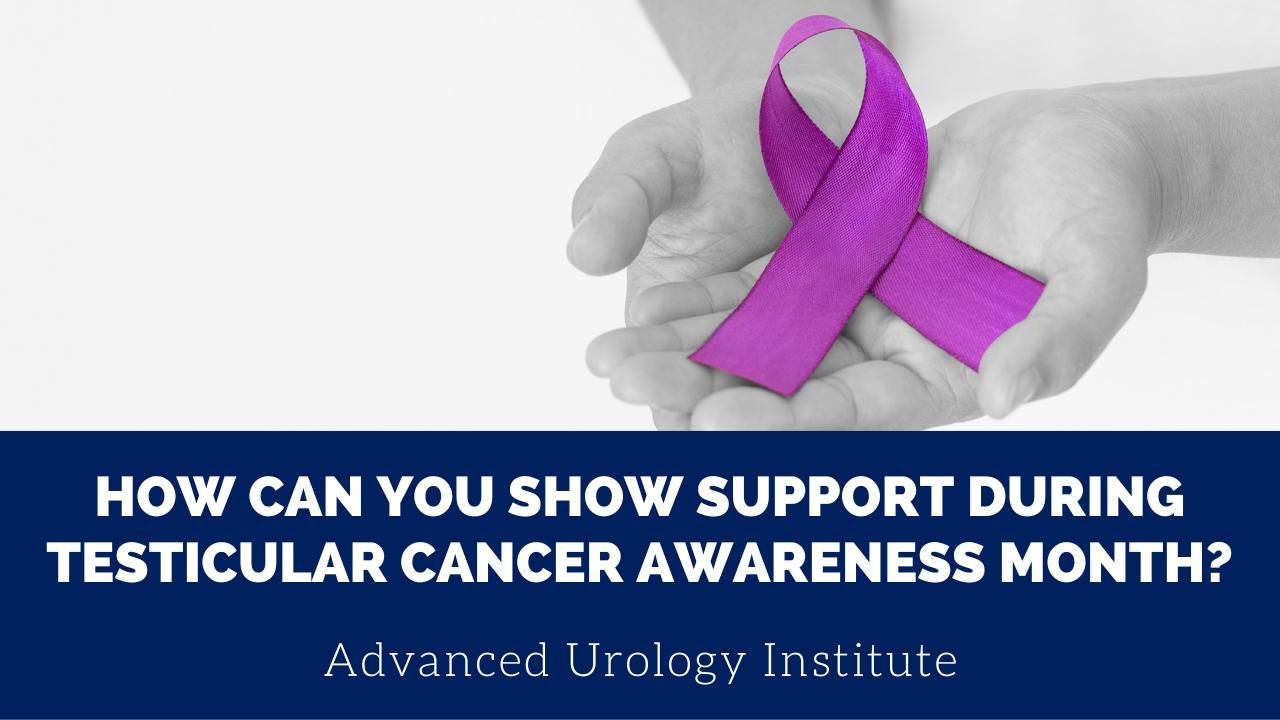 Testicular Cancer Awareness Month is a month-long campaign that aims to raise awareness about testicular cancer and promote early detection and treatment. It takes place every April, and its significance cannot be overstated. Testicular cancer is one of the most common types of cancer among men aged 15 to 35, and it is highly treatable if detected early. In this article, we will explore the importance of supporting the cause and provide practical ways for readers to get involved.
Testicular Cancer Awareness Month is a month-long campaign that aims to raise awareness about testicular cancer and promote early detection and treatment. It takes place every April, and its significance cannot be overstated. Testicular cancer is one of the most common types of cancer among men aged 15 to 35, and it is highly treatable if detected early. In this article, we will explore the importance of supporting the cause and provide practical ways for readers to get involved.
II. Understanding Testicular Cancer
Testicular cancer is a type of cancer that starts in the testicles, the male reproductive glands located inside the scrotum. It can develop in one or both testicles and is more common in younger men. The exact cause of testicular cancer is unknown, but some risk factors include a family history of the disease, undescended testicles, and abnormal testicular development.
Symptoms of testicular cancer may include a lump or swelling in the testicle, a feeling of heaviness in the scrotum, pain or discomfort in the testicle or scrotum, and a dull ache in the lower abdomen or groin. It is important to note that not all lumps or swelling in the testicle are cancerous, but it is essential to get them checked by a doctor to rule out any serious conditions.
Early detection and treatment of testicular cancer are crucial for a positive outcome. Treatment options may include surgery, chemotherapy, or radiation therapy. The earlier the cancer is detected, the more likely it is to be treated successfully.
III. Ways to Show Support During Testicular Cancer Awareness Month
There are many practical ways for readers to get involved and show support during Testicular Cancer Awareness Month. Here are some suggestions:
- Share information about Testicular Cancer on social media.
Social media is an excellent platform for raising awareness and sharing information about testicular cancer. Readers can share facts and statistics about the disease, post links to resources, and use hashtags like #TesticularCancerAwarenessMonth to join the conversation.
- Wear the color purple/violet or a Testicular Cancer awareness ribbon.
Wearing purple/violet or a Testicular Cancer awareness ribbon is a simple but powerful way to show support. Readers can wear purple/violet clothing or accessories, tie a purple/violet ribbon to their car or bike, or even dye their hair purple/violet.
- Donate to Testicular Cancer research and advocacy groups.
There are many organizations dedicated to funding research and advocating for men with testicular cancer. Readers can donate to these groups to help support their mission and further the fight against the disease.
- Participate in local fundraising events.
Many communities host fundraising events during Testicular Cancer Awareness Month, such as walks or runs. Readers can participate in these events to show their support and help raise funds for research and advocacy.
IV. Interview with a Testicular Cancer Survivor or Expert
To provide readers with insights and advice from someone who has been directly affected by testicular cancer or an expert in the field, we reached out to Dr. Mark W. Dersch, a urologist at Advanced Urology Institute, and a survivor of testicular cancer himself. Dr. Mark W. Dersch shared his experience with us and offered some advice for others who may be going through a similar situation.
Dr. Mark W. Dersch was diagnosed with testicular cancer in his mid-20s and underwent surgery to remove the affected testicle. He stresses the importance of early detection and encourages men to perform regular self-exams and seek medical attention if they notice any abnormalities in their testicles.
Dr. Mark W. Dersch also emphasizes the importance of having a support system during and after treatment. He recommends seeking out support groups or connecting with other survivors to share experiences and offer support.
V. Conclusion
Testicular Cancer Awareness Month is an essential time to raise awareness about testicular cancer and promote early detection and treatment. By understanding the risks, symptoms, and treatment options, men can take charge of their health and seek medical attention if necessary.
There are many practical ways for readers to get involved and show support during Testicular Cancer Awareness Month, from sharing information on social media to participating in local fundraising events. Donating to research and advocacy groups can also help fund advancements in treatment and prevention.
Finally, the personal experience of a survivor or expert like Dr. Mark W. Dersch reminds us of the importance of early detection and having a support system during and after treatment. Testicular cancer is a treatable disease, but it requires vigilance and awareness from men and their loved ones.
As we approach Testicular Cancer Awareness Month, let us all commit to raising awareness, supporting research and advocacy efforts, and empowering men to take charge of their health. As Dr. Mark W. Dersch reminds us, “Early detection is key. Don’t wait, take action, and get checked.”
REFERENCES:
- “April is Testicular Cancer Awareness Month | The AACR.” https://www.aacr.org/patients-caregivers/awareness-months/testicular-cancer-awareness-month/.
- “Testicular Cancer: Symptoms and Signs.” https://www.cancer.net/cancer-types/testicular-cancer/symptoms-and-signs.
- “Signs and Symptoms of Testicular Cancer.” 17 May. 2018, https://www.cancer.org/cancer/testicular-cancer/detection-diagnosis-staging/signs-and-symptoms.html.
- “Testicular Cancer Awareness Month.” https://www.testicularcancerawarenessfoundation.org/tc-awareness-month
Exploring the Diagnosis of Enlarged Prostate
Your doctor will diagnose an enlarged prostate by performing a physical exam, collecting a urine sample, and conducting various other tests that may include a urinalysis, ultrasound and blood test.
Continue readingUnderstanding the Root Causes of an Enlarged Prostate
Enlarged prostate, or benign prostatic hyperplasia, is a common condition experienced by men over the age of 45. While the exact cause of BPH is unknown, it is linked to age-related factors, genetics and certain medications.
Continue reading



